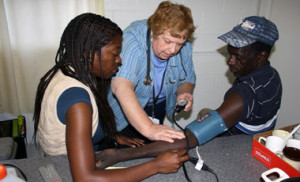“The Greatest Gift Is Compassion”
This past year has been a busy year and also a challenging one. We were able to extend access to health care into five new counties located in northwestern Pennsylvania near Erie County. We now have five sites serving the migrant and seasonal farmworkers and their families in 30 counties in Pennsylvania and a few camps we visit in Maryland. This is an increase of 11 counties during these past 4 years. We have also been able to establish working contracts with additional federally qualified health centers – one in Erie and one in Lancaster, giving us a total of 12 clinics that provide health care to our migrant and seasonal workers. Besides clinic visits, the staff in these various sites during the picking season, also attends patients in the migrant camps 3 evenings a week during the months of June through mid-November.
Last year, over 2,600 patients were seen during the farm season–with over 3,550 visits. These include clinic visits seeing patients who work at orchards, produce farms, vineyards, dairy farms, poultry farms, nurseries, packing houses, mushroom farms, and Christmas tree farms.
The U.S. Bureau of Primary Health Care has many requirements regarding the operation of this program, and due to this, I must travel a good bit around Pennsylvania seeing that all of these requirements are in place. Many times during these trips, though, I do have the opportunity of going out with our local staff to visit the workers in the camps, and I have gotten to know workers from many areas of Mexico, Guatemala, Honduras, El Salvador, Puerto Rico, Jamaica and Haiti. We have had also an influx of refugees from Bhutan and Nepal recently.
However, the best part of my health care ministry is when I have the time and the opportunity to go out in the evenings to our local Adams County migrant camps with our team of nurses and interpreters to see patients. These men and women are not accustomed to have health care workers come to them and, above all, to have someone actually sit down and listen to them. I believe this is the greatest gift we can give to them – showing compassionate listening, besides providing treatment. Believe me, this gift also is reciprocal.
Recently, I went up to the five northwestern Pennsylvania counties surrounding Erie to conduct health screens on the workers in the dairy farms. We went with a staff member from the local Migrant Education staff. As you know, Erie is in a snow belt. The week we were up there it was very cold, a mixture of rain and snow, and as we were literally sloshing through the mud to get into these places, I really felt at home. It was so much like the paths in Peru and Guatemala. The amazing part for me is that in each of these dairy farms, all of the workers were men and women from Guatemala. Many were from aldeas in which I had worked, so you can imagine the great conversations we all had. I even had to get some of the men to translate for me into Mam for some of the workers. This was the local language of the people where I had worked in Guatemala.
I laughingly asked the women where their beautiful huipils (blouses) and lovely woven cortes (skirts) were. They all laughed and some of the women said that they wear their local dresses in the house. It was strange to see these Guatemalan women dressed in sweatshirts and jeans. They were carrying heavy pails, lifting hay, and leading the cows in from the fields. It was a great week.
Every year in October we have the East Coast Migrant Stream meeting. Each year it is held in a different city along the East Coast. At this meeting, much time is spent on the Affordable Care Act and the need to enroll legal workers in the new health care insurance plans. This is presenting a great challenge to us. Many of our workers are legal residents and now by law they must be enrolled in one of the health care plans. The challenge for us is how to make them aware that they must comply with this new rule, and how and where to go to enter into the enrollment process for their insurance.
We also do many health screens with parents’ groups who have children enrolled in the Migrant Headstart program. We work especially with the women who come together for classes in English as a Second Language. They’re employed in the packing houses during the day. It affords us an opportunity to be able to sit down and also talk with the women, and needless to say they are grateful to have some of us who speak Spanish to answer their many and varied questions.

